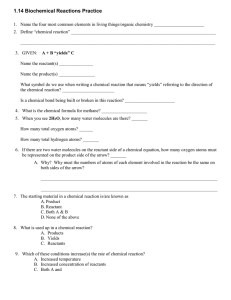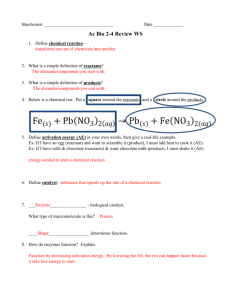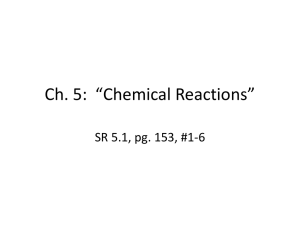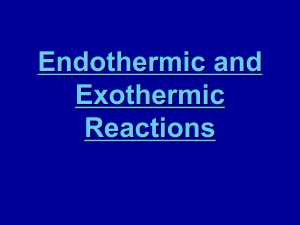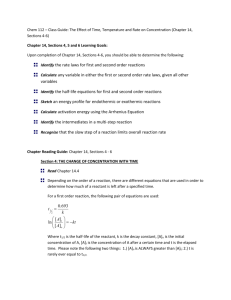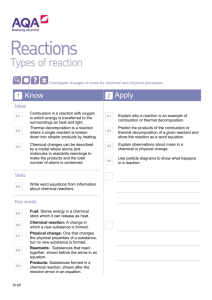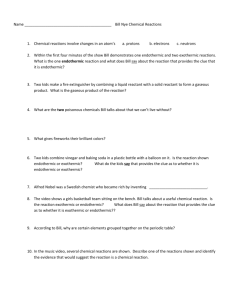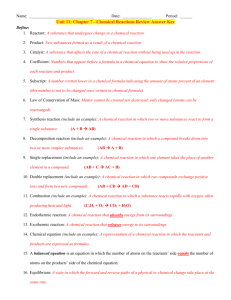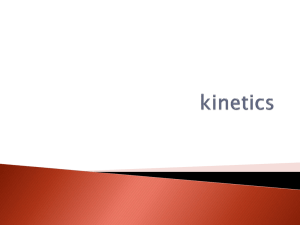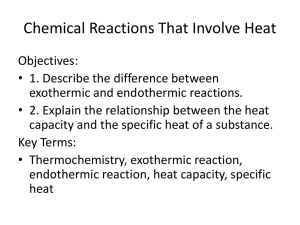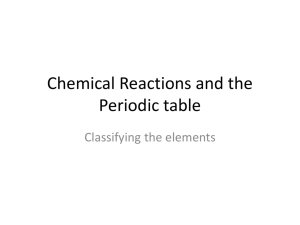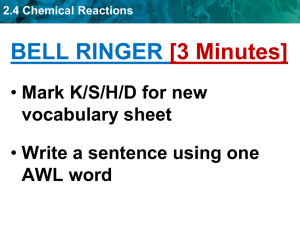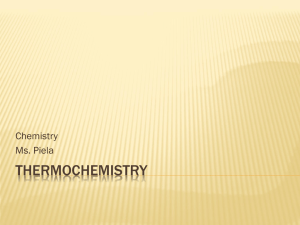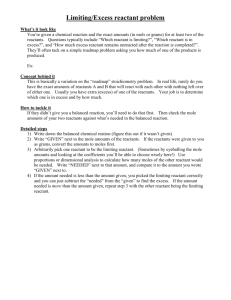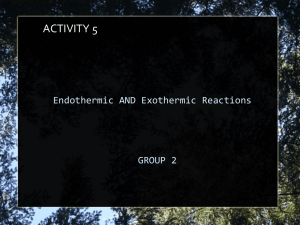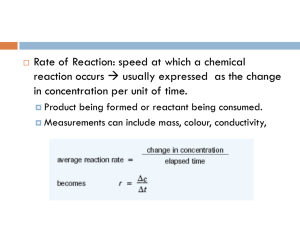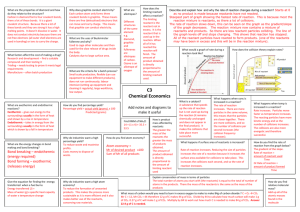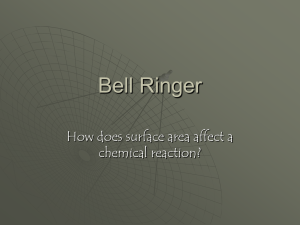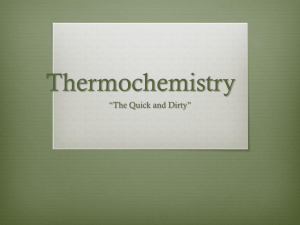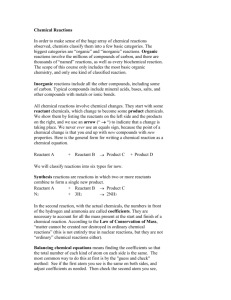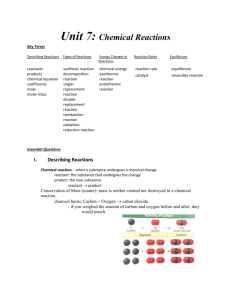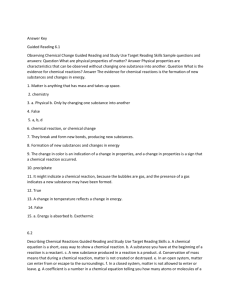Chemical Reactions
advertisement
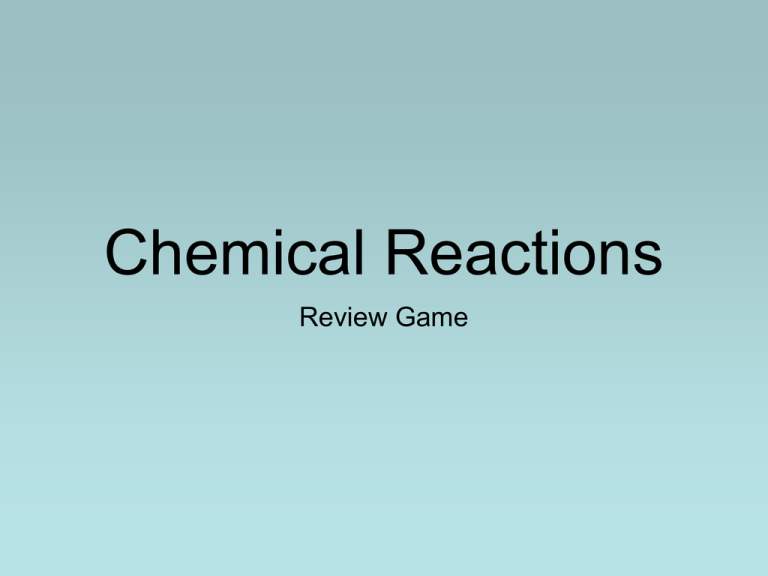
Chemical Reactions Review Game Rules • Lab Table Teams 1-6 • One representative from each lab table will come to a buzzer to receive a question on the board • Each correct response results in 1 point Rules Cont. • Incorrect answer: Same question goes to any other person remaining that did not buzz in before - awarded 1 point • Next question will go to another set of lab table representatives • Outside talking amongst lab tables during a round results in deduction of point Rules Cont. • Allow me to read the question fully before responding • First response - only response (cannot change answer) Question 1 • What is the definition of a reactant? Question 2 • You freeze a bucket of water into a solid block of ice. What type of change is this? Question 3 • How can a chemical reaction seem to gain or lose mass? Question 4 • What happens to the atoms of the reactants during a chemical reaction? Question 5 • What are the 3 physical factors in which to increase the rate of a chemical reaction? Question 6 • You combine 2 elements, sodium (Na) and chlorine (Cl), to make sodium chloride (NaCl). What type of chemical reaction is this? • 2Na + Cl 2 ---> 2NaCl Question 7 • If you ignite methane, what type of chemical reaction is this? Question 8 • What are the products of all combustion chemical reactions? • extra point = what is the reactant of all combustion reactions? Question 9 • If you have 1 complex reactant, and it breaks apart into 2 or more simple products, what type of chemical reaction is this? Question 10 • Finish the following statement: Matter cannot be _________ nor __________. Question 11 • How can you tell if a chemical reaction has produced a gas? Question 12 • What happens to the bonds of the reactants at the beginning of a chemical reaction? Question 13 • You mix vinegar with baking soda and it begins to bubble. What is the chemical reaction producing? • extra point = what type of compound is produced Question 14 • What happens to the bonds of the products at the end of a chemical reaction? Question 15 • You mix 2 liquids and a white, solid product is formed. What is the evidence of a chemical reaction? Question 16 • A chemical reaction starts at a o 10 o 24 temperature of C then ends at C. Is this an exothermic or endothermic chemical reaction? Question 17 • How will the mass of the reactants compare to the mass of the products in a chemical reaction? Question 18 • Is energy absorbed or released in an exothermic reaction? Question 19 • What rule is missing from the Law of Conservation of Mass below? • Matter cannot be created nor destroyed. Atoms are re-arranged in chemical reactions • Reactions that seem to gain or lose mass involve reactions with gases in the air •? Question 20 • What is the chemical factor that you can add to a reaction to increase its rate? Question 21 • You have a solid reactant, and break it apart into smaller pieces before adding it to a second reactant to make the reaction go faster. What factor did you alter to the solid reactant to increase the rate of the reaction? Question 22 • In the lab in which you added chalk and hydrochloric acid (HCl), you decided to add more HCl to the reaction to make it go quicker. What factor did you alter to the HCl to increase the rate of the chemical reaction? Question 23 • What is the special feature of a catalyst during a chemical reaction? Question 24 • You burn a pile of wood while camping. What type of change is this? Question 25 • What is the definition of a product? Question 26 • The speed at which molecules in a chemical move and collide with each other refers to its what? Question 27 • How can you increase the surface area of a reactant in order to increase the rate of a chemical reaction? Question 28 • If you are increasing the amount of molecules present in a reactant, what factor are you increasing to increase the rate of the chemical reaction? Question 29 • How are the atoms of the reactants forming the product(s) during a chemical reaction? Question 30 • Is energy released or absorbed in an endothermic chemical reaction? Question 31 • 2 clear liquids are mixed together and the product is a pink liquid. What is the evidence of a chemical reaction? Question 32 • Before a chemical reaction, you measure the masses of your 2 reactants. The first reactant is 100 g and the second reactant is 250 g. What should be the mass of the product after the chemical reaction? Question 33 • A chemical reaction starts at a o 24 o 10 temperature of C then ends at C. Is this an exothermic or endothermic chemical reaction? Question 34 • Both exothermic and endothermic chemical reactions show what type of evidence of a chemical reaction? Question 35 • Are combustion chemical reactions exothermic or endothermic chemical reactions? Question 36 • Are decomposition reactions examples of exothermic or endothermic chemical reactions? Bonus Question • The following general equation represents a chemical reaction... • AB ---> A + B • If this was an endothermic reaction, where would the majority of the energy be found in the reaction?
